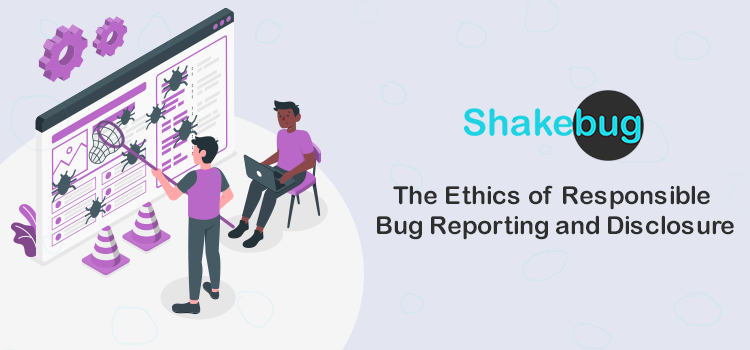The Impact of Bug Reporting and Disclosure on Stakeholders
The ethics of responsible bug reporting and disclosure have become increasingly important in recent years. Bug reports can have a huge impact on stakeholders, from users to developers, so the process must be handled with care.
Responsible bug reporting involves identifying potential issues quickly and accurately while also taking into account the needs of all parties involved. Disclosure should only occur after careful consideration has been given to how this could affect each stakeholder’s interests. Organizations need to ensure they are following ethical practices when dealing with bugs to protect everyone involved.
How Unreported Bugs Can Harm Users and Businesses
Unreported bugs can have serious consequences for both users and businesses, as they can lead to security vulnerabilities, data loss, or even system crashes. Developers must take responsibility for their code by properly testing it before releasing a product into production.
Additionally, when a bug is discovered after release, there should be clear guidelines on how to report it responsibly so that other users are not harmed by its effects. By following these ethical practices, companies will ensure their products remain secure and reliable while protecting user safety at all times.
Balancing the Need for Disclosure with Protecting Sensitive Information
When it comes to the ethics of responsible bug reporting and disclosure, there is a need for a balance between disclosing information about security vulnerabilities and protecting sensitive data. Organizations must understand how their systems are vulnerable so they can take steps to protect themselves from potential attacks.
At the same time, companies must ensure that any vulnerability reports or disclosures do not put customer data at risk by exposing confidential information. Companies should have policies in place to ensure that all parties involved in bug reporting and disclosure adhere to ethical standards while still providing adequate protection against malicious actors.
Related Read:- 21 Common Bug Reporting Mistakes and How to Avoid Them
The Role of Ethics in Bug Reporting and Disclosure
The ethics of responsible bug reporting and disclosure is an important topic to consider. In today’s world, the security of software systems is paramount for businesses as well as individuals. As such, any potential vulnerabilities in these systems must be reported responsibly and with due care taken to ensure that no harm comes from their disclosure.
It is also important to understand the role of ethical considerations when deciding how best to report a vulnerability or disclose information about one. This includes understanding who should be informed first, whether there needs to be coordination between different stakeholders involved in the process, and what steps need to be taken afterwards.
Responsible bug reporting and disclosure require careful consideration of all relevant factors before taking action so that everyone can benefit from improved security measures without putting anyone at risk unnecessarily.
Understanding the Responsibility of Security Researchers and Bug Bounty Hunters
Understanding the responsibility of security researchers and bug bounty hunters is an important part of ethical responsible bug reporting and disclosure. Security researchers must report any vulnerabilities they find to help protect users from malicious actors, while also ensuring that companies are aware of these issues so they can be addressed quickly.
Bug bounty hunters should take into account the potential consequences their actions may have on both parties involved before disclosing information about bugs or vulnerabilities publicly. Everyone involved in this process needs to understand the importance of responsible behaviour when it comes to identifying and addressing security risks.
Best Practices for Responsible Bug Reporting and Disclosure
The ethics of responsible bug reporting through bug reporting tool and disclosure is an important topic to consider when developing software. Organizations need to have a clear policy in place that outlines best practices for responsible bug reporting and disclosure, as well as the consequences if those policies are not followed.
This includes making sure all stakeholders understand their roles and responsibilities in identifying potential security vulnerabilities or bugs within the codebase. Additionally, it’s important to ensure there are processes in place that allow developers to report any issues they find quickly and efficiently so they can be addressed promptly.
Following these guidelines will help keep your organization secure while also protecting users from malicious actors who may exploit known vulnerabilities.
The Legal and Regulatory Framework for Bug Reporting and Disclosure
The ethics of responsible bug reporting and disclosure is an important topic in the world of software development. It involves understanding the legal and regulatory framework for bug reporting and disclosure, as well as ethical considerations when it comes to how bugs should be reported or disclosed.
Responsible bug reporters must consider whether a particular issue needs to be publicly disclosed if there are any potential risks associated with disclosing the issue, and what steps need to be taken to ensure that all parties involved are aware of the issue.
Additionally, they must also take into account privacy concerns related to personal data being exposed due to security vulnerabilities. By following these guidelines, developers can ensure that their code is secure while still adhering to ethical standards when it comes to responsible bug reporting and disclosure.
Overview of Data Protection Laws and Requirements for Bug Reporting
Organizations need to understand the laws and requirements in place that govern how bugs should be reported, as well as what information must be disclosed about them. Organizations need to take into account the potential risks associated with disclosing too much or not enough information regarding a bug report.
They also need to ensure they have appropriate procedures in place for handling any reports received from outside sources, such as security researchers or hackers. By understanding these regulations and taking steps towards compliance, organizations can help protect their customers’ data while still allowing necessary disclosures around vulnerabilities.
Risks of Non-Compliance with Bug Reporting and Disclosure Regulations
Companies must be aware of the risks associated with non-compliance when it comes to bug reporting and disclosure regulations. It’s essential for companies to have a clear understanding of their responsibilities, as well as any potential liabilities they may face if there are issues with compliance or security breaches that occur due to bugs that were not reported properly.
Companies should also ensure that all employees involved in software development understand the importance of proper bug reporting and disclosure procedures so that everyone can work together towards creating secure products.
Conclusion
Responsible bug reporting and disclosure is an important ethical consideration for software developers. It’s essential to ensure that the security of users’ data is not compromised by any vulnerabilities in a system or application. Developers should take into account all possible implications when deciding how to handle bugs, including potential legal ramifications.
Responsible bug reporting and disclosure can help protect both users and organizations from malicious actors who may exploit known vulnerabilities.


